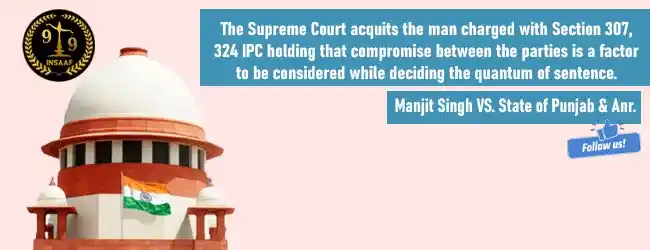2023-Dec-16

The Supreme Court has allowed an appeal and set aside the Judgment and Order of the Punjab and Haryana High Court at Chandigarh by which the High Court has acquitted accused-Ranjit Singh from the charges by giving him benefit of doubt but affirmed the conviction of the appellant-Manjit Singh by the Trial Court and the sentence of imprisonment imposed upon him. The High Court had also enhanced the fine amount from Rs.1,000 to Rs.50,000/- with a direction to pay the same to the complainant-Hardip Singh as compensation. However in view of the settlement and compromise between the parties the Supreme Court has set aside the fine amount and has also confined the term of imprisonment from 5 years to the period already undergone.
The facts leading to the filing of the present criminal appeal are that the complainant-Hardip Singh was returning to his village from bus stop on his scooter when the appellant-accused, Manjit Singh, along with his brother Ranjit Singh, armed with knife, are said to have attacked/inflicted knife blows on the left and right thigh of the complainant. On the complaint lodged by the complainant a case was registered under Section 307 read with Section 34 I.P.C. and Section 324 read with Section 34 I.P.C. After completion of the investigation, the charge sheet was filed against the accused for the aforesaid offences.
Upon consideration of the evidence of the complainant/injured person and other witnesses, the Trial Court convicted the accused appellant-Manjit Singh and his brother Ranjit Singh under Section 307 I.P.C. and sentenced each of them to undergo rigorous imprisonment for five years along with fine of Rs.1000/- each. For the offence punishable under Section 324 I.P.C., they were sentenced to undergo rigorous imprisonment for two years. In appeal, the High Court affirmed the conviction of the appellant and also the sentence of imprisonment imposed upon the accused Manjit Singh. The High Court, however, acquitted the accused Ranjit Singh by holding that the charges against him are not proved beyond reasonable doubt. Being aggrieved, the appellant-Manjit Singh preferred an appeal before the Supreme Court.
The Supreme Court observed thus:
“Section 307 I.P.C. is a non-compoundable offence. No permission can be granted to record the compromise between the parties. In Ishwar Singh v. State of Madhya Pradesh, (2008) 15 SCC 667, the Supreme Court of India has held that in a non-compoundable offence the compromise entered into between the parties is indeed a relevant circumstance which the Court may keep in mind for considering the quantum of sentence.
In our considered opinion, it would not be appropriate to order compounding of an offence not compoundable under the Code ignoring and keeping aside statutory provisions. In our judgment, however, limited submission of the learned counsel for the appellant deserves consideration that while imposing substantive sentence, the factum of compromise between the parties is indeed a relevant circumstance which the Court may keep in mind.”
What can the Legal Experts do for you? Our team of lawyers is ready to help you in minutes with any legal question.
 Whatsapp
Whatsapp
 Toll Free :-
1800-212-9001
Toll Free :-
1800-212-9001